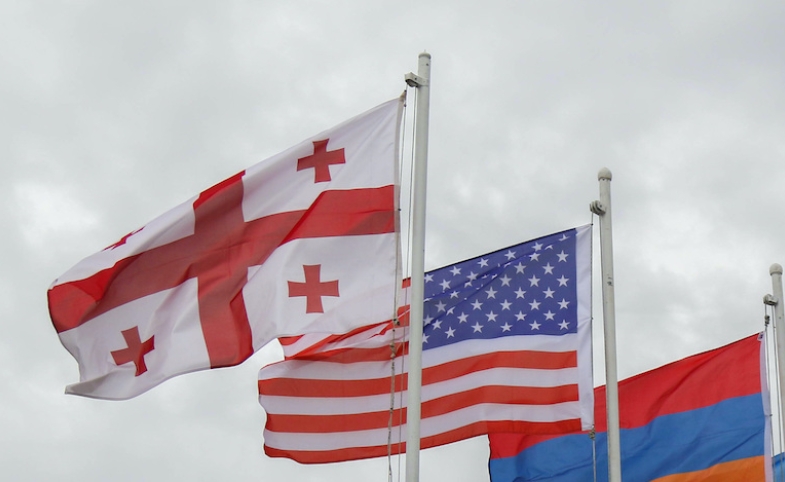The CPD Blog is intended to stimulate dialog among scholars and practitioners from around the world in the public diplomacy sphere. The opinions represented here are the authors' own and do not necessarily reflect CPD's views. For blogger guidelines, click here.

Lessons from the US' Public Diplomacy: Perspectives from Georgia
A comprehensive picture of U.S.-Georgia relations can only be provided if the public diplomacy component is not downplayed. Georgians listen to Louis Armstrong, read Ernest Hemingway and watch George Lukas movies. They like being taught by Peace Corps volunteers at schools to excel in American English skills. They praise the U.S' support to Georgia, which ranges from rebuilding education institutions and infrastructure to economic, trade, or defense cooperation. But is U.S. public diplomacy more about engaging Georgians to inspire community- and policy-relevant action or is it just a process to inform and influence Georgians about American culture?
Public diplomacy is a new and expanding field of study and a full attention to historical and modern tendencies of this particular interactive foreign policy tool is not yet paid in Georgia’s scholarly or non-academic community. There are several reasons for this, one of which is the shortage of knowledge in theory and practice of public diplomacy. But since the early 2010s, when my research and publications in the discipline of American Studies focused on public diplomacy, I often ask myself what lessons can be learnt from the U.S' public diplomacy. Here I present three lessons from the U.S' public diplomacy that took me around six years of research to answer in a monograph, published recently.
First lesson: re-explore U.S. leadership. When I was a student in American Studies, I was taught about the United States without even mentioning the term "public diplomacy." After I discovered this field, I realized that knowing public diplomacy dynamics changes our understanding about practices of American leadership. Nowadays public diplomacy is at the center of my courses in American Studies. When discussing U.S. diplomatic, military, or economic capabilities, public diplomacy gives my students a more comprehensive sense of its leadership when they know, for example, why enhancing national security and advancing national interests matter.
Second lesson: rethink U.S.-Georgia relations. Much of Georgia’s democratic developments are a result of U.S. public diplomacy efforts. If we study how jazz ambassadors championed American values in Georgia during the Cold War, how sports diplomacy helped Georgians transcend cultural differences, or how exchanges foster people-to-people ties, then we can better realize the shifting dynamics of U.S.-Georgia relations.
Third lesson: build public diplomacy at home.
Considering the challenges and opportunities, successes and failures of American public diplomacy can inform Georgia’s present public diplomacy...
Considering the challenges and opportunities, successes and failures of American public diplomacy can inform Georgia’s present public diplomacy when its objective is to successfully build a more democratic society and to have a rising positive global image. Reviewing U.S, public diplomacy teaches us that a diligent analysis of our home country’s history, values and interests is important. This can pave the way to establish country-specific strategies to expand Georgia’s relationship abroad.
These threads run throughout my monograph titled “U.S. Public Diplomacy in Georgia: From Cold War to Strategic Partnership.” Published in Georgian, this book centers the role of public diplomacy in U.S.-Georgia relations. It offers interdisciplinary and multi-disciplinary accounts of how American public diplomacy instruments built bridges of friendship and cooperation between the United States and Georgia during the Cold War and explores how it transformed U.S.-Georgia relations into strategic partnership.
This book is divided into nine parts. To establish the context of the modern U.S. public diplomacy, the first two parts provide an appraisal of American public diplomacy as a part of U.S. foreign policy and as an instrument of its national security. The third and fourth parts examine cultural diplomacy and citizen diplomacy and highlight how these types of public diplomacy advanced U.S. foreign policy objectives by informing Georgians during the Cold War. The fifth part analyzes how jazz diplomacy illustrated U.S. culture and society in Soviet Georgia and how jazz ambassadors told an American story to Georgian audience. The following part highlights the importance of American public diplomacy for “open” and “closed” societies in the case of Soviet Georgia. Chapters seven and eight provide an analysis for the role of public diplomacy in U.S.-USSR and U.S.-Georgia relations in the 1980s. The ninth part evaluates American public diplomacy in modern Georgia.
Building and developing public diplomacy as a field of scholarship worldwide can become one of the missions of the U.S' public diplomacy. Although public diplomacy is not an established discipline in Georgia, a need to facilitate an active dialogue about it is indispensable. The interdisciplinary and multi-disciplinary nature of American Studies programs might be a good basis to integrate public diplomacy into its curricular. I hope this book will become an essential reading for scholars, students and practitioners, as well as anyone interested in understanding American public diplomacy in Georgia and U.S.-Georgia relations. Small steps can bring changes in public diplomacy. If public diplomacy attracts an increased attention from scholars, then its practice can be better synchronized into Georgia’s foreign policy capabilities.
Visit CPD's Online Library
Explore CPD's vast online database featuring the latest books, articles, speeches and information on international organizations dedicated to public diplomacy.
POPULAR ARTICLES
-
January 29
-
January 20
-
January 28
-
January 2
-
January 8
Join the Conversation
Interested in contributing to the CPD Blog? We welcome your posts. Read our guidelines and find out how you can submit blogs and photo essays >.









